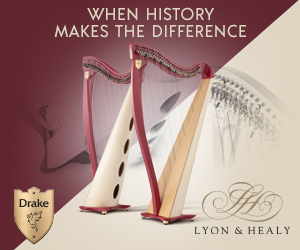Home › Forums › Teaching the Harp › Do you teach your students how to practice? › Re: Do you teach your students how to practice?
Well, I think there has to be an age at which practice becomes independent of the parent’s aid, depending on the child’s ability to remember instruction and practice well. I’m not saying they shouldn’t help them stay interested and focused, but it seems to me it should be a private activity, just like lessons. It depends on the characters involved, motivations and dependency. I saw a mother who acted like a classic stage mother, talked through 75 percent of the lessons, made career decisions for her teen, even though she really knew nothing about music. Here was a student who was caught in a dependency, smothered, and placed on a track not necessarily best for her, or so it seemed, as she did not communicate very directly.
I avoid the aforementioned problems by teaching students to practice everything, easy or difficult. If they learn to start beat by beat, then measure by measure, making sure everything is correct and musical, and linked, then there are no extreme problem spots. Learning to break things down is essential. It also eases memorization. I tell students not to count each repetition in terms of the music’s progress, for you must do as many as it takes to improve, but to look at how they are changing with each repetition, how their focus improves, and everything else. Using external devices for counting reinforces the external, but the internal progress should be the focus. Nevertheless, one does lose count. I used to use an abacus and slide the beads over. Empty, thoughtless repetition does not lead to the most effective progress, though it may strengthen. If the students learn to repeat exercises, simple ones like four-note scales, and focus on the internal aspect and improvement, then it will be easier with repertoire. And you do find that each repetition has its own quality, the fifth and sixth repetitions are quite different from each other, and it begins to lock in after seven, and eight, nine, ten reinforce it. When it comes naturally, then you can practice longer segments. This is how I practice today, when I’m good, and when I’m bad, I just read through stuff. So it is as important for the professional as the student, and if I had learned this way early on, who knows where I’d be today? The mind is a powerful thing to harness, and a terrible thing to waste. I remind myself of Jennifer Hoult, who was the best student by far, when I entered Manhattan School of Music, and who had terrific concentration and could learn very complex music extremely well. I am easily distracted by environment, and only achieved ideal practice in places like Tanglewood and Camden, Maine, therefore my insistence on quiet, cell-like rooms for practice. Well, maybe a window for light and air. There’s nothing like facing up to just you and the harp and even blank walls. Then there is nothing but what you accomplish. The pride and strength one has in what one has grown to do and achieve is a wonderful thing.
It is interesting to note the difference between students who rely on talent alone and those who work diligently.





